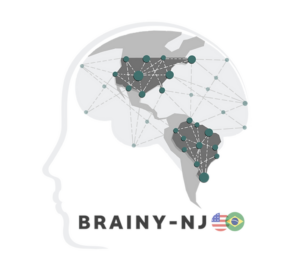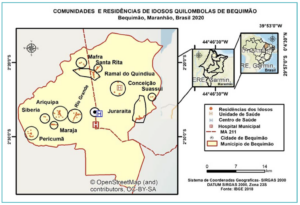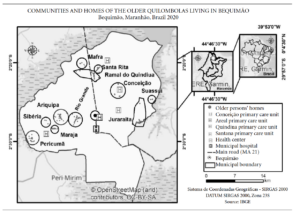Research
Multitasking Strategy Study (MUST Study): an Online Cognitive Training
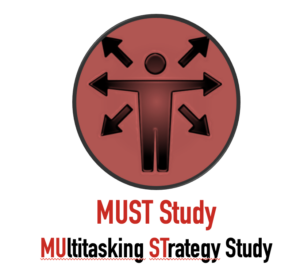
In a world with dense information and multimedia interaction,
multitasking abilities have become relevant to everyday life.
Despite that, there is still debate about whether multitasking is effective or not: should we multitask in everyday life?
Are there strategies or programs that can improve our attention and multitasking abilities?
Join the MUST Study and help us better investigate these questions.
The MUST Study is a research project that aims to test the efficacy of a new online cognitive training program in improving attention and multitasking abilities, which relates to our capacity to manage multiple goals in the same context.
The study is currently recruiting participants until mid-2027. Participants will receive financial compensation to attend in-person assessments and online (remote) intervention sessions. Total participation lasts about 5 months, including: one cognitive assessment (in-person) and one blood exam before the training program, 11 online training sessions (3 times a week), one cognitive assessment (in-person) by the end of the program, and a follow-up evaluation (in-person) after 3 months.
The MUST study is funded by the NIH – National Institute of Aging
Principal Investigator: Dr. Sharon Sanz Simon
(clinicaltrials.gov NCT06995638)
Contact us if you are interested in participating, collaborating, or supporting us.

___________________________________________________________________________________________________________________
Brazilian Aging in New York – New Jersey Study (BRAINY-NJ Study)
Contact us: brainy.nj.study@rutgers.edu
The BRAINY-NJ Study (see our website) is a research project that aims to investigate risk and resilience factors for healthy aging and Alzheimer’s Disease and related Dementias (ADRD) in the Brazilian immigrant population (55+ years old) living in the New York City metropolitan area, including New York and New Jersey states.
We launched the study in March 2025 and are recruiting paid participants for clinical and physical exams, cognitive assessments, and blood tests. Total participation lasts approximately 6 hours with our team: one in-person visit, one blood exam, and a second visit (within a month) that can be in-person or online.
The BRAINY-NJ study is funded by the Alzheimer’s Association
Principal Investigator: Dr. Sharon Sanz Simon
Contact us if you are interested in participating, collaborating, or supporting us.
About the Study (English) / Sobre o Estudo (Portuguese)
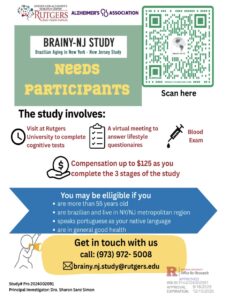
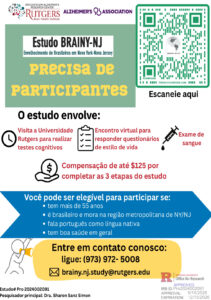
___________________________________________________________________________________________________________________
Aging in Quilombola Population in Brazil: The INQUIMA Study
Health Survey & Epidemiological Study on Minority Health
The INQUIMA study is a research project that aims to investigate lifestyle and environmental factors associated with the risk /protection of cognitive health, mental/brain health, and dementia in an underrepresented group: the Brazilian Quilombola population. The research partners with 11 rural Quilombola communities in Bequimão County, Maranhão State (Brazil). The research is recruiting Quilbolas participants from 60 years and above.
Quilombola communities, or Quilombos, are settlements founded by descendants of runaway slaves in Brazil. They are predominantly located in remote rural areas, and the poor living conditions make Quilombolas a socially vulnerable group with limited access to education and health services. By mapping risk/protective factors for dementia in a vulnerable population, this project may inform public health policies for underserved communities.
The INQUIMA study is funded by the National Council for Scientific and Technological Development (CNPQ),
Brazilian Ministry of Science, Technology and Innovation
Principal Investigator: Dr. Bruno Alves Oliveira
Co-Investigators: Dr. Sharon Sanz Simon, Dr. Carolina Cappi and Dr. Gilberto S. Alves
